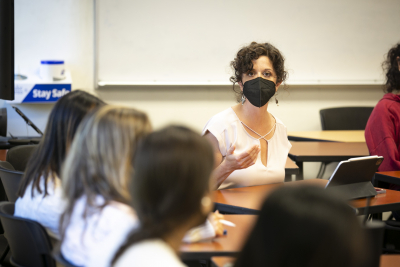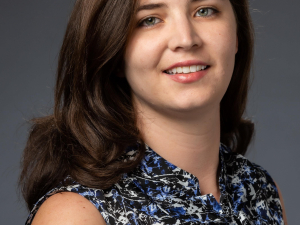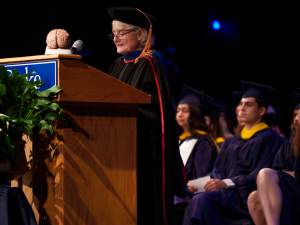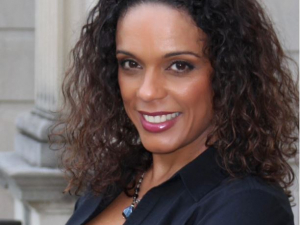Tamar Kushnir, Bringing New Ideas on Learning and Cognition in Young Children

This fall, Tamar Kushnir joined the Psychology & Neuroscience faculty along with Assistant Professor Cristina Salvador. Kushnir, an expert on social learning and social cognition in young children, received her Ph.D. in Cognitive Psychology from the University of California, Berkeley, and joins Duke from Cornell University where she was Professor in the Department of Human Development. We spoke to Kushnir about her research, the Early Childhood Cognition Lab she will run at Duke, her approach to teaching and what brought her to Duke.
Why were you interested in joining Duke?
I was drawn to Duke because of the diversity of scholarship here and the fact that interdisciplinary collaboration is so encouraged. The departments of Psychology & Neuroscience and Philosophy have wonderful people whose work I have admired for years, and it’s great to now be at the same institution with them, working together. I’m looking forward to exploring opportunities for community engagement with organizations that work with children and families in the Durham area, and to building collaborations that serve community needs.
I also think it’s fun to move. I enjoy the diversity of perspectives that moving offers. Plus, it keeps you young, because you have to work hard on things that you may have taken for granted for a long time, like setting up a lab.
What are your research interests and guiding framework?
I’m interested in how young children learn so much so quickly, and especially how they acquire knowledge about abstract concepts. In cognitive development, we often refer to children’s abstract knowledge of the world as their “intuitive theories” – in part because this knowledge is coherent and organized, like theories in science, and in part because children acquire theories like scientists: by exploring, experimenting, asking questions, and relying on knowledgeable sources. In my lab, we work to map out how children’s concepts and theories change over development. We also work on the process of learning itself. On the ‘theory’ side, we study children’s knowledge of causality, mental states, moral and social norms, self-efficacy, agency and free will. On the ‘process’ side, we study causal and statistical learning, learning actively through play, and social learning through imitation and instruction.
What are some projects you’re excited about working on this year?
One of the main thrusts of our current work is to look at the role that culture and the social environment play in children’s learning and meaning making. I’m excited about two new projects: one is a large-scale multi-site international collaboration funded by the John Templeton Foundation that asks how children develop social, moral, and religious (or spiritual) beliefs in diverse cultural contexts. Another is a National Science Foundation funded study in collaboration with the Yale Social Robotics Lab on the role that social trust plays in children learning from technology, especially technologies that are designed to engage with children in human-like ways. My graduate students are interested in a variety of topics in social and moral cognition, and I work with a postdoctoral researcher with expertise in moral development who wants to study the origins of gossip.
I’ve been around long enough to see the tangible transformation that has occurred from incorporating diverse voices into cognitive and social science. Teaching students to learn freely and without fear is my only goal.
What is your approach to teaching and learning?
My approach to teaching and mentorship draws in many ways from the research in how children learn best: by being active, engaged and driven by their own curiosity. My favorite professors in college and graduate school were people who encouraged me to find my own unique contribution rather than matching an external standard. I was risk-averse and self-conscious, so it wasn’t easy. Now I try to emulate this as much as I can when I teach, acting as a scaffold or facilitator of students’ personal growth as scientists and as humans, rather than setting objectives for what they ought to learn. I’ve been around long enough to see the tangible transformation that has occurred from incorporating diverse voices into cognitive and social science. Teaching students to learn freely and without fear is my only goal.
Right now, I’m teaching a seminar called “Psychology of Imagination” where we study the cognitive, neural, and developmental processes at work within the capacity to reason about alternatives to a current reality. Students read different topics each week, discuss collaboratively and work on a semester-long individual project in their area of interest. It’s pure fun to be in this course with such amazing students week after week.
What are some things you’re enjoying about Durham?
I’m looking forward to learning more about the culture and history of this area. Of course, I love the local climate and the fall weather is perfect for runners! I just finished my first non-virtual race since the start of the pandemic. It was in downtown Durham, and it was amazing. One of my children has graduated from high school and is doing a gap year in Israel, and the other is a junior in high school here. She’s making friends at her new school and working on getting her North Carolina driver’s license. I just bought a house in Durham and I’m really looking forward to hosting my family for Thanksgiving this year.




